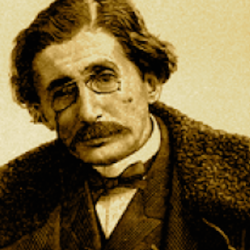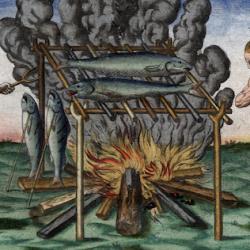One driving interest behind Rosenstock-Huessy’s grammatical method is hissuggestion that speech the means for integrating the demands of the Cross of Reality, and for meeting the crises that arise at each pole of the Cross. Rosenstock-Huessy wants to rescue grammar from the grammarians, and restore grammar and language to their fully social and political status.
Social evils, he says, can be reduced to four main types – war, revolution, anarchy, and decadence. Each of these is a crisis in regard to one dimension of the cross of reality. Anarchy is a crisis “inside” the closed circle of the community:
“The evil of anarchy prevents translocal units from cooperating. They are not inspired by unanimity, and they fail to meet each other regularly for a sincere restoration of unanimity. They break up the unit into sections. Everybody is making his pile,. Grabbing more than his share, and exploiting his membership in ways unforeseen. Anarchy, or, in economics, the crisis, the depression, is caused by a lack of cooperation and of common inspiration. The good that would cure the ill is unanimity. For, then, the different agents in space would function as one body politic whereas now each agent is pursuing his own interest only” (Speech and Reality [SR],12).
Decadence is a failure of the older generation, a failure of the past to initiate and inspire future. Decadence occurs when elders “do not have the stamina of converting the next generation to their own aims and ends.” It “means to be unable to reach the future, in body or mind or soul. The decadence of an older generation condemns the younger generation to barbarism. Decadence of parents leaves children without heritage.”
Decadence is the “disease of liberalism today,” and “the only energy that can fight this evil is faith,” since faith is “never a belief in things of the past, but in the future” (SR 12-13).
Revolutions occur when “the future generation does violence to the existing order and to the people formed in and by the past. The old are ‘liquidated,’ ‘eliminated,’ because they are considered ‘past men’” (SR 13). War, finally, is a failure in peaceable relations with the outside: “Wars try to incorporate external territory. Anarchy tries to disestablish unity within one body politic, it destroys its inner unity. Wars disregard extraterritoriality” (SR 13).
War and anarchy point to the social division of inner and outer space, the border line that “like the skin of an individual animal, cuts the world of space into two parts, one inner, one outer” (SR 13).
These social evils are all failures at one pole of the Cross of Reality, but Rosenstock-Huessy also describes them, more concretely, as failures of speech, failures that can only be healed by speech. Wars occur when there is a failure of speech between one group and another, and to bring peace, “people who have not been on speaking terms, begin speaking again.” Decadence occurs when “the old no longer have the enthusiasm for teaching the young their own faith,” and only a renewal of teaching can heal decadence. Anarchy is a “lack of unanimity, of common inspiration.”
Though the same words are used, “the words (like justice, welfare, commonwealth) do not have an identical meaning among men.” When revolutions occur, “all the language and traditions of the past are devaluated like an obsolete currency” (SR 14). In every case all the social evils “hurt language,” and they must do so because “language is the weapon against those four social ills” (SR 14-15). The four evils “dismantle society” by destroying one of the corners of its fortress, but “all speech defends these four fronts.”
Rosenstock-Huessy gives a more thorough treatment of this in the opening chapter of The Origin of Speech [OS]. He describes the four social evils are four “‘speech-lacking’ ways of life.” War occurs when people disagree about good and evil, truth and falsehood; war occurs when groups do not speak a common language, and the true speech of each group is hidden within the enclosed circle of the group. This can happen between two nations, but it can also happen within a group; a civil war occurs when two parts of a group cease to speak a common language. War is different from the pre-relation situation, when two groups do not disagree with each other but simply have nothing to say. War occurs when this not-speaking “has come to a head and has led to an outbreak of violence” (OS 11).
Indifference is a cause of war, as spatial neighbors don’t speak and then become incapable of speaking to one another (OS 12). Peace, however, is the ultimate result of war; to be born, peace must “go through the travail of birth called war” (OS 12).
Revolution is not conflict between spatial neighbors, but between temporal neighbors. Revolutionaries do not “listen to the old language of law and order,” but instead “create a new language” (OS 12). Before they reach this point, however, revolutions are inarticulate, as the young shout on the streets.
In the end, revolution creates a new language: “In a revolution old speech is rejected by a new shout which struggles to become articulate. The revolutionaries make a terrific noise but nine tenths of their whoops will evaporate and the final language spoken by the bourgeoisie or the proletarians thirty years later will have been cleared of these shouts of the beginning” (OS 12).
Revolution is an attack of today or tomorrow on yesterday, but yesterday can attack tomorrow too. “Tyranny” or “counterrevolution” (elsewhere, decadence) occurs when the old attack the young. Tyranny does not shout in the streets, but instead gives lipservice to old and outdated slogans. Tyranny is hypocritical (OS 13).
Tyranny leads inevitably to degeneracy: “No children are born, no future is envisaged, small communities dwindle. No new enterprises of small size originate any more. The sources of new life dry up” (OS 13). Lip service doesn’t just characterize tyranny, but causes it: “If society is so ‘cliché,’ so clogged that it won’t let my day arrive ever, it has degenerated. If speech is unable to be reborn sufficiently, speech is absent between old renowned life and new unknown life” (OS 13).
Finally, anarchy is a problem of authority: People are not told what to do. Rosenstock-Huessy suggests that an unemployed person is a person without orders, who is seeking for orders. He’s looking for someone to tell him what to do, and in this economic form “anarchy” takes the form of economic “crisis” (OS 14).
Speech is not first of all for expressing ideas or thoughts, but is first of all orders. When no orders are given, then nobody knows what to do. Anarchy is the opposite of war: “In war we won’t listen to the enemy. In crisis we can’t find anybody to tell us. In war there is too little willingness to listen; in crisis too few people are willing to give orders, to speak with the original power of speech, with the power of direction” (OS 15).
Each of these four diseases of speech manifests itself as a hypersensitivity to one sort of speech and an immunity to another speech:
War is hypersensitive to “words spoken inside” the group, but “immune to words from the outside.”
Revolution is hypersensitive to “shouts of the young,” but “immune against the old slogans and laws of old.”
Tyranny gives lipservice to “stock phrases,” but is “immune against inarticulate new life.”
Anarchy’s hypersensitivity is harder to locate, but it is “immune against words spoken ‘inside’ my society” (OS 14).
Put another way,
“War: not listening to what the foe says
Crisis: not telling the friend what to do
Revolution: inarticulate shouting
Degeneration: hypocritical repetition” (OS 15).
Or again: The four evils are these speech diseases:
“Deafness to the foe
Muteness to the friend
Shouting down old articulation
Stereotyping new life” (OS 16).
The solution to these four diseases is to integrate “speaking and listening, articulating and repeating.” When a group is healthy, it “uses old terms for new facts (repetition), new terms for old facts (articulation), spreads out to new people (speaking), and includes every worthwhile speaker (listening)” (OS 15).
In short, it integrates old and new, inside and outside: “The two acts of listening and speaking constantly extend the territorial frontiers of speech. We want to be able to speak to all and listen to all. The two acts of repeating and articulating constantly extend the temporal frontiers of speech. We want to link up with all past and future generations” (OS 15).
Rosenstock-Huessy responds to the objection that reducing these social crises to problems of speech is trivializing. How can World War I, the Russian Revolution, the 1929 collapse of the stock market, and the fall of France be considered merely problems of speech?
He responds by suggesting that these problems seem bigger than speech precisely because the “plenitude of speech” has dried up (OS 17), and that if speech would be renewed, the social evils would be recognizable for what they are – speech crises. He also makes the argument that the solutions point to the nature of the disease: Wars are remedied by listening, revolutions by re-formulating, economic crises by trust, and decadence by new representatives (OS 17).
As this shows, Rosenstock-Huessy has a fairly expansive notion of what “speech” involves. It involves chat, but also involves all other uses of language, including song, prayer, judicial sentencing, legal declarations, performative utterances, etc. Four “styles of speech” bring healing to the four diseases of language:
“Men reason, men pass laws, men tell stories, men sing. The external world is reasoned out, the future is ruled, the past is told, the unanimity of the inner circle is expressed in song. People speak together in articulated language because they fear decay, anarchy, war, and revolution. The energies of social life are compressed into words. The circulation of articulated speech is the lifeblood of society. Through speech, society sustains its time and space axes” (SR 16).
Relations with the outside are re-established through reason; the future is secured by legislative speech; men tell stories to preserve the past; and we sing together as a way of renewing mutual inspiration, to breathe the same breath together.
















